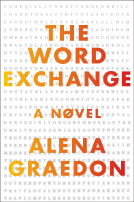When words attack your brain
This post has been like 3 weeks coming. Eek. The whole review is a little different style since the book runs different to my standard fare. It is not a book many will find enjoyable, but to those that would prefer a mind-stretching exercise machine, this will be a profitable review.
 I write this review with very mixed feelings and can't decide where to place the star rating, so I don't think I will because I want to be fair. There is going to be a very specific audience for this novel. I chose it from the description tugging my heartstrings for the fate of the printed word. It proclaimed a lexicography thriller for the digital age.
I write this review with very mixed feelings and can't decide where to place the star rating, so I don't think I will because I want to be fair. There is going to be a very specific audience for this novel. I chose it from the description tugging my heartstrings for the fate of the printed word. It proclaimed a lexicography thriller for the digital age.
The Word Exchange by Alena Graedon
 I write this review with very mixed feelings and can't decide where to place the star rating, so I don't think I will because I want to be fair. There is going to be a very specific audience for this novel. I chose it from the description tugging my heartstrings for the fate of the printed word. It proclaimed a lexicography thriller for the digital age.
I write this review with very mixed feelings and can't decide where to place the star rating, so I don't think I will because I want to be fair. There is going to be a very specific audience for this novel. I chose it from the description tugging my heartstrings for the fate of the printed word. It proclaimed a lexicography thriller for the digital age.
Let me begin with--I found this a painful read. In terms of general fiction with a smattering of futuristic thriller and dash of romance in the background, the book really could not grab my attention (if I read it too late at night, I instantly fell asleep). I needed all brain cells firing to keep pace with the intensity of language and doctoral thesis writing.
Now that I have gotten that unpleasant fact out of the way, let's continue. The book itself is written from a future stand point reflecting back on how events stacked up to get Anana a.k.a. Alice to the point of writing this memoir. The chapters are alphabetical, which makes for a very long 26 chapters. They switch between the telling of past events from Anana to the journal entries of Bart. What I liked about this concept: it gives layers to the perspective, we have a varying cast of characters, and there is an added dimension to the story that often falls flat and dry in other areas. What I do not like about the concept: it is very clunky in formatting and flow, Bart's journal entries remind me of my college theses (very boring, irrelevant dissertations on the world of linguistics and literature) not diary entries, and it loses a very personal touch to the characters making them almost anesthetic.
Another con that kept me from reading this novel smoothly--the actual writing. Sometimes it feels like a memoir, a PhD level treatise better suited for an educational journal, or a dime-store mystery novel. There is no real style but a mash up. (Yes I do understand that is the point. I did not like it.)
While the novel is about an editor for the dictionary, that should not require me to have an actual dictionary next to me while I am reading. The author often chose to use archaic, overly pompous words from characters who aren't really either of those things. I'm all for stretching the brain muscles while I read, but the language here really took it a step too far.
What I did like about this novel--the message of language degradation. Unfortunately, the thesis isn't quite valid to me. Her argument for media, the constant drive to create streams of conscious instead of treatises, and the creation of new words is pointed in the wrong direction. Media must spring from somewhere, and that is the ingenuity and creativity of writers. There will always be creators of the story. Our written word may fade (which would indeed make this bookworm very sad), but there was a time that our histories were oral traditions and art not words. It will all cycle back around; a true ouroboros. The true shame of language degradation comes in far more nefarious forms in sheep's clothing. Look at educational institutions eliminating English standards in favor of boosting student self-confidence.
Wow, that was a lengthy review. All these negative factors and minor complaints aside, this novel could easily shape up to be a great book in your collection, and it will certainly make you think about the world around you. I really do suggest this book to those who want a lot more intellect with their reading.
Wow, that was a lengthy review. All these negative factors and minor complaints aside, this novel could easily shape up to be a great book in your collection, and it will certainly make you think about the world around you. I really do suggest this book to those who want a lot more intellect with their reading.
Comments
Post a Comment